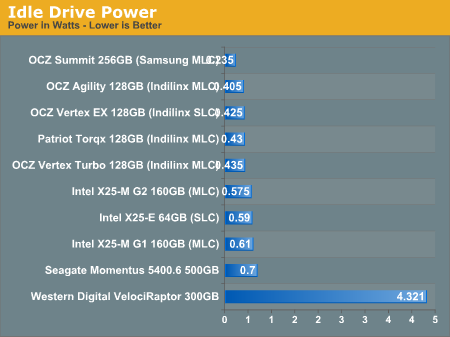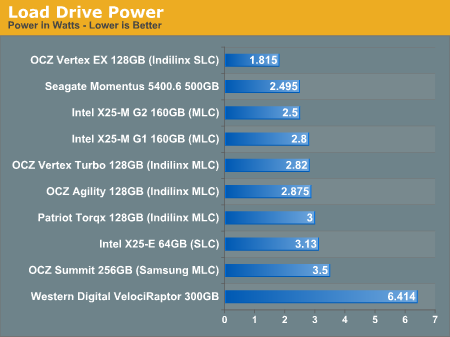The SSD Relapse: Understanding and Choosing the Best SSD
by Anand Lal Shimpi on August 30, 2009 12:00 AM EST- Posted in
- Storage
Power Consumption
SSDs are at their highest power consumption when performing large file sequential writes. The majority of the power consumption comes from writing to the NAND flash and when you’re doing sequential writes you have more flash devices engaged at a time. Thus my peak power consumption test involves measuring power used over the 5V rail while the drives perform my 2MB sequential write benchmark in Iometer and at idle of course.
First, the idle numbers:

The Samsung and Indilinx drives use the least power, while the Intel drives use the most out of the SSDs. Intel honestly just needs to stick some power gate transistors in front of the controller and flash to curb power consumption at idle. They are all still lower than a mechanical drive, and much lower than a 3.5" HDD.
It's also worth noting that given the order of magnitude performance advantage these drives hold over traditional hard drives, they spend far more time at idle than their mechanical counterparts.

Under load the SSDs use anywhere from 2.5 - 3.5W, the exception being the Indilinx SLC drive which comes in at under 2W. Power consumption is roughly half if you switch to a random write workload, and the standings also switch places. While Intel's X25-M G2 draws less power than the OCZ Vertex Turbo in the sequential write test, it draws more power in a random write workload:
| Random Write Power Consumption | Min | Average | Max |
| Intel X25-M G2 160GB (MLC) | 1.55 W | 1.60 W | 1.7 W |
| OCZ Vertex Turbo 128GB (Indilinx MLC) | 1.13 W | 1.17 W | 1.21 W |
As I alluded to before, the much higher performance of these drives than a traditional hard drive means that they spend much more time at an idle power state. The Seagate Momentus 5400.6 has roughly the same power characteristics of these two drives, but they outperform the Seagate by a factor of at least 16x. In other words, a good SSD delivers an order of magnitude better performance per watt than even a very efficient hard drive.










295 Comments
View All Comments
albor - Friday, June 18, 2010 - link
Hi,try RamDisk Plus 11 from SuperSpeed.
(http://www.superspeed.com/desktop/ramdisk.php)
I use it on Xp pro 32 bit with 30 GB OCZ Vertex and 8 GB RAM. All above 3.2 GB is configured for swap and temp. Works perfectly and no visible SSD performance degradation after about 10 months.
Greetings.
jmr3000 - Thursday, August 23, 2012 - link
would explain to me how did you install it?the ssd as a second drive or did u install all the program on the ssd and use the hhd as a second?
thanks in advance!
jm
marraco - Friday, August 13, 2010 - link
SWAP file is one of the most important speed bottleneck on windows.it writes frequently to disk, so consumes the read write cicles of the disk, reducing his useful life.
But you are not buying space storage when you buy SSD. You are buying speed, so it makes nosense to buy an expensive SSD, and then remove from it all the activities that need the speed and are bottlenecks.
you buy a SSD to do the fastest SWAP. keep it on SSD.
Also, drive indexing permanently does a lot of reads, but it does not matter if the disk is fast. Drive indexing is like a little local google. If you disable it, and then search for all the files with a given text on it, searching the entire disk takes longer than just read an indexing.
Those activities consume the useful life of the disk, but at the time the disk gonna need replacement, (5 years, maybe), this disk gonna need replacement anyways, and new SSD gonna be dirty cheap, so it makes no sense to disable swap, temp files, and indexing.
On other side, prefetch, superfetch and defrag most probably are better disabled under SSD.
jimlocke - Wednesday, June 1, 2011 - link
Pehu, I know this much after your posting, but I was curios what you ended up doing for swap.8GB of RAM almost seems like swap may not be needed, unless you have several memory-hogging apps open.
Hope you still like your SSD. I'm looking at getting one soon, and agree this was an excellent article!
-Jim
krumme - Friday, October 9, 2009 - link
First: I submit to the importance of random 4k for ssd.Second: Over the years I have highly valued the articles of Anand. It is remarkable to see such detailed and enthusiastic information.
Now I have a few questions, following the general impact of this work.
Some observations first:
Following an article at Toms of a ssd article the 6 of September. The author was called a “Moron”, primarily as the random 4k synthetic bm was missing. The author was giving a different opinion on the indilinx vs intel, in the desktop sector, compared to Anand, giving more weight to transfer vs iops.
In an discussion about a Kingston V-series review, one said that he would take the indilinx ssd any day because it was “750 times faster” – an argument based on iops.
Another remark I have read several times is: “The Intel x25-M g2 is the only drive to get”.
Another is: “I would like to buy the Dell xx, but it has an Samsung controller so its of no use”.
I think it is time to stop, and make sure there is reason in what is happening for normal desktop use.
Do we have blind test where to tell the difference between the Intel, Samsung and Indilinx?
What is the actual real world bm fx. Win7 boot times for the 3 controlers?
There is something called good enough. When is 4k random read/write time enough, to not notice any subjective improvement afterwards in win7? Could it be fx. 10M/s?
The ssd is the best thing happening since 3d gfx, but I think we should enjoy what is happeing right now, because this time, could be the turning point where we soon are focusing on small differences.
Anyone knows what´s the next big thing?
bebby - Friday, October 30, 2009 - link
Random 4k and its relevance for desktop use is really the main topic for me, too.If I assume that I only use the SSD for the OS and software and save my data on other, much less expensive HDDs, I doubt very much that this discussion is worth it. The Samsung SSD then suddenly looks not so bad at all and much cheaper...
The next big thing for me would be an OS starting up in 5 seconds, like the OS we had in the 90s...making SSD obsolete.
bebby - Friday, October 30, 2009 - link
Random 4k and its relevance for desktop use is really the main topic for me, too.If I assume that I only use the SSD for the OS and software and save my data on other, much less expensive HDDs, I doubt very much that this discussion is worth it. The Samsung SSD then suddenly looks not so bad at all and much cheaper...
The next big thing for me would be an OS starting up in 5 seconds, like the OS we had in the 90s...making SSD obsolete.
marraco - Friday, August 13, 2010 - link
I agree completely. I think that human beings can nottice the difference between a hard disk, and a non bad SSD, because the difference is too large, but over "good enough", it does not matter much if the SSD is 2X or 4X faster in 4Kb random R/W.But mine is just an opinion, and I don't have good data to test it. I would like to read an article with repeatable testing on human perception.
SimesP - Wednesday, September 23, 2009 - link
I haven't read all 254 comments (yet) but I'd like to add my thanks to everyone elses for the comprehensive and illuminating article. This, along with the previous AnandTech SSD articles have increased my understanding of SSD's immensely.Thanks again!
ClemSnide - Friday, October 2, 2009 - link
Anand,A couple of guys from HotHardware.com pointed me at your SSD article, and it allowed me to make an informed decision. Thanks!
I wanted to speed up one game in particular (World of Warcraft) as well as routine OS tasks and web browsing. I think an SSD will do a bang-up job on at least the first two. The one I decided upon was the OCZ Agility 60 GB, which offers some growth room; I currently have 40 GB on my system drive. I know the Intel has better numbers, but I was able to get the OCZ for $156 after a rebate, which translates to decent performance at a price I can justify. (For the curious, it's available from TigerDirect for $184, and OCZ is giving a $30 rebate.)
Even though my system build is still months away, this should be usable on my old clunker as well. Very nifty!